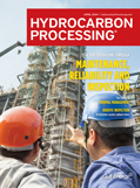People
HP Flashback: Excerpts from the 1950s: Capacity expands after WW2 and technologies and maintenance mature
The following is a mixture of technical articles, columns and headlines published in the 1950s by <i>Petroleum Refiner,</i> the forerunner to <i>Hydrocarbon Processing</i>.
History of the HPI: The 1950s: Capacity expansion, HDPE/PP, polycarbonate, computers and rocket science
The 1950s marked an evolution in the use of oil by nations around the world.
Raising the alarm: Understanding the operator’s perspective on refinery process alarms
As refineries and petrochemical complexes worldwide are moving toward more automated operations, plant operators are increasingly becoming dependent on process alarms for safe, smooth and continuous operation.
The EPC executive’s challenge and opportunity: Navigating the sustainability shift in capital projects
According to an industry report published by McKinsey and Co., accelerating the decarbonization of the U.S. economy to achieve net-zero targets by 2050 will require approximately $275 T of cumulative capital spending over the next 30 yr.1
Editorial Comment: Advancing maintenance ultimately leads to increased reliability
This year, <i>Hydrocarbon Processing</i> is celebrating its 100th anniversary. Throughout this year, the editors are publishing excerpts from past issues.
History of the HPI: The 1940s: Global conflict, FCC, 100 octane, synthetic rubber—Wartime necessitates advancing technologies
<i>Hydrocarbon Processing</i> continues its look at the history of the hydrocarbon processing industry (HPI).
Industry Pioneers: Polymer science, catalytic cracking, petrochemicals and EPC
Waldo Semon was an American chemist whose detour with assigned laboratory research at B. F. Goodrich led to the development of vinyl—the second best-selling plastic in the world.
People
Hunter Buildings names Michael Draper as Chief Operating Officer
Construction pitfalls in SRU-fabricated equipment
In the hydrocarbon processing industry, sulfur recovery is a well-known process. However, this process uses a variety of equipment.
Industry Pioneers: Polymer science, catalytic cracking and chemical advances
The Austrian-born chemist, Hermann Francis Mark, is well-known for his contributions to the development of polymer science, which he devoted more than 60 yr of his life to.

- Haldia Petrochemicals awards ethylene plant digitalization contract to Lummus 5/2
- INEOS completes purchase of LyondellBasell's EO&D facility in Bayport, Texas (U.S.) 5/2
- HPLNG delays commissioning of Chhara LNG import terminal in India 5/2
- Shell records nearly $8-B Q1 profit on the back of refining, chemicals/products and LNG divisions 5/2
- Water treatment specialist SurfCleaner supplies Norwegian energy giant Equinor 5/2
- U.S. White House: Russia shipping fuel to North Korea above UN cap 5/2




